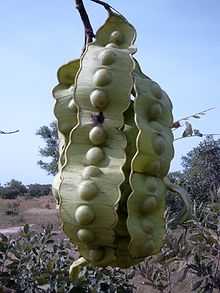Entada
From Wikipedia, the free encyclopedia
| Entada | |
|---|---|
 | |
| Entada africana fruit | |
| Scientific classification | |
| Kingdom: | Plantae |
| (unranked): | Angiosperms |
| (unranked): | Eudicots |
| (unranked): | Rosids |
| Order: | Fabales |
| Family: | Fabaceae |
| Subfamily: | Mimosoideae |
| Tribe: | Mimoseae |
| Genus: | Entada Adans.[1] |
| Species | |
|
See text | |

Entada abyssinica - MHNT

Entada africana
Entada is a genus of flowering plants in the pea family, Fabaceae, subfamily Mimosoideae. It consists of some 30 species of trees, shrubs and tropical lianas. About 21 species are known from Africa, six from Asia, two from the American tropics and one with a pantropical distribution. They have compound leaves and produce exceptionally large seedpods of up to 1.5 metres (4.9 ft) long. Their seeds are buoyant and survive lengthy journeys via rivers and ocean currents, to eventually wash up on tropical beaches.
Selected species
- Entada abyssinica Steudel ex A. Rich.
- Entada africana Guill. & Perr.
- Entada chrysostachys (Benth.) Drake
- Entada gigas (L.) Fawc. & Rendle - Sea Heart, Cœur de la mer (Pantropical)
- Entada monostachya
- Entada phaseoloides (L.) Merr. - St. Thomas Bean (Oceania, East Asia). Commonly called Gogo in the Philippines.
- Entada polystachya (L.) DC.
- Entada rheedii Spreng. - Snuff Box Sea Bean (Africa, South Asia, Southeast Asia, Australia)
References
- ↑ "Entada Adans.". Germplasm Resources Information Network. United States Department of Agriculture. 2007-10-05. Retrieved 2009-04-01.
External links
This article is issued from Wikipedia. The text is available under the Creative Commons Attribution/Share Alike; additional terms may apply for the media files.